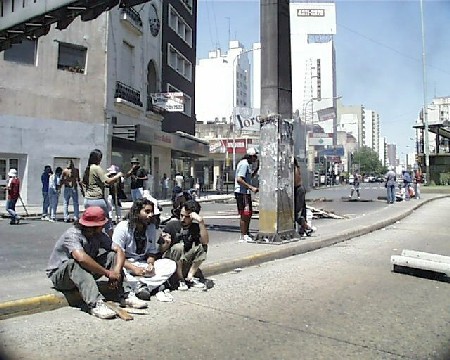 We are invited to have lunch with some of the people who work on the newsletter. They live on the other side of Admiralte Brown where small concrete houses give way to row after row of identical grey apartment blocks.
We are invited to have lunch with some of the people who work on the newsletter. They live on the other side of Admiralte Brown where small concrete houses give way to row after row of identical grey apartment blocks.
Over lunch in a small flat which doubles up as the newsletter office, we talk about global networks of resistance and swap stories of struggle and tactical tips. I tell them about the very different kind of roadblocks that I had been involved in with Reclaim the Streets in London. They tell me about the "Queen of the Piquete" fashion show that was put on by queer piqueteros during a road block. The extraordinary image of drag queens dancing through barricades of burning tyres is a hard one to shake.
The next day someone tells me that Carla, the large woman in her late fifties who cooked us lunch is in fact the same person who appears in the middle of the double page spread of the first edition ( and this edition) of our Argentina report, pictured sitting in front of burning tyres on blockaded motorway, masked up and wearing mirror shades!
These kind of apocalyptic images are, the overriding public image of the piqueteros. Leading up to the murders of the 26th of July, the mainstream media were manufacturing stories of violence including rumours that some piqueteros were preparing for armed uprisings inspired by leftist guerillas. On the day itself, minutes after the deaths the media reported the police statements which said that the deaths were the result of rivalry between different Piquetero groups, something they had to retract as soon as pictures of the police shooting directly at individuals at close range came out. Two enormous demonstrations of support with people from every social strata have taken place since then and the piquetero movement itself is continuing to grow rapidly. "Since the 26th, links to the neighbourhood Assemblies movement have grown, they realise that we are not that different from them" explained Anna, one of the editors of the local MTD news letter.
The murders and mass arrests of the 26th changed a lot for the Annibal Verron network: "None of us are born MTD activists, we have to become one, we are a new movement," Maria explained to me, "since the deaths we have two priorities - to change the way we organise so as to dismantle the fear of repression that is growing and to have food for everyone in the movementî. A big debate is taking place about the role of masking up during actions, and it seems a decision has been made to stop wearing masks for the time being.
The challenge is to present the movement as unemployed workers, first, piqueteros, second. The piquete is just a tactic - though an amazingly successful one. "Direct action gets the goods," was the slogan of the Wobblies at the turn of the 20th century, and for the piqueteros that is certainly true. They block the roads, demand a specific number of 'plan trabajor', the unemployed subsidies, and more often than not get them from the local government - about 40 pounds a month per person. They have also used the tactic to back various demands, including getting food from supermarkets.
Last Christmas they picketed eight blocks, closing down six supermarkets in one go. They demanded food for the neighbourhood's Christmas dinner. Lines of supermarket workers, who had been threatened with losing their jobs if they did not comply, protected the supermarkets behind a line of shopping trolleys and security guards. Eventually the Piqueteros convinced the management that it would be cheaper for them to give them food than to remain closed for the entire day.
But it's the constructive aspects of the movement which they want to show to the world: the self organisation, the direct democracy and the numerous neighbourhood projects, the bakery, the ropero and so on. As in many protest movements it is these constructive elements which are so difficult to make visible. The powerful current in our culture which obscures constructive, creative situations with the spectacle of conflict and confrontation runs deep.
The murders were less than 20 days ago, and yet no one seems paralysed by despair: "If another companero had been killed, Dario would have kept up the struggle, in fact he would have worked even harder... we have to continue to fight for food and projects - if we give up, we will have nothing," says Tanya.